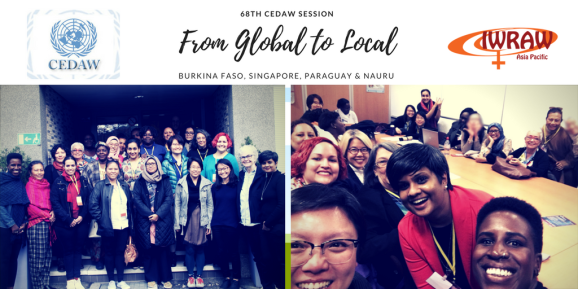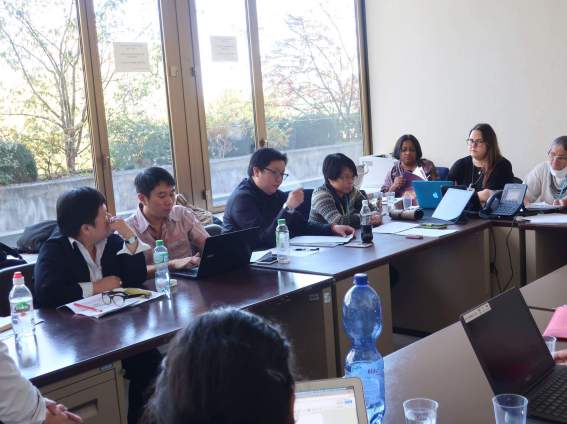This post was originally published as a press release on 22 November 2017.

The United Nations’ CEDAW committee has repeated its recommendation that Singapore include in its Constitution or laws a definition and prohibition of all forms of discrimination against women.
The Committee, comprising international experts, issued its recommendations in a document “Concluding Observations” on Tuesday 21 Nov following the discussions it had in Geneva in October with a delegation from the Singapore government. The recommendations are to guide Singapore in fulfilling its obligations under the women’s human rights treaty CEDAW (Convention for the Elimination of All Forms of Discrimination Against Women).
Emphasising the “crucial role of the legislative power in ensuring the full implementation” of CEDAW, the Committee urged Singapore’s Parliament to “take the necessary steps” to implement its recommendations.
A key call is for legislation to define and prohibit discrimination against women. In the previous CEDAW review in 2011, the Committee had called for the same change. It cited the 2014 Court of Appeal case of Lim Meng Suang, which ruled that the Constitution presently forbids only discrimination on grounds of “religion, race, descent or place of birth”.
The Committee formulates Concluding Observations following a thorough review process, taking into account information from various sources, including reports prepared by the State, other UN agencies and NGOs, as well as oral statements made by NGOs in Geneva on 23 October 2017. This was followed by a day-long “Constructive Dialogue” in Geneva on 25 October 2017, during which the Committee posed questions to and heard answers from the Singapore delegation.
Particular attention is also paid to ending gender-based violence against women, with the Committee highlighting the provision of gender-sensitivity training at all levels of the criminal justice system and the systematic collection of disaggregated data on such violence as among the key areas for the state’s immediate follow-up.
The Concluding Observations cover a range of topics relevant to gender equality, based on CEDAW articles. Their recommendations include:
- Singapore is urged to eliminate the concept of “head of household” in all policy- and decision-making, and to promote equal sharing of family responsibilities.
- Domestic workers should receive the same labour protections as other workers, including under the Employment Act, and restrictions on their changes of employer should be revised.
- Marital immunity for rape should be abolished, as was also recommended in the 2011 Concluding Observations.
- The Administration of Muslim Law Act should be reviewed to provide women with equal rights as men in marriage, divorce and inheritance, including through prohibiting polygamy.
- Gender stereotypes, including in media coverage of politics, need to be combatted.
- To tackle workplace harassment, the Government should ensure that all employers implement the Tripartite Advisory on Managing Workplace Harassment.
- Disaggregated data on older women, including those belonging to vulnerable groups, should be collected and used to formulate policies and programmes which take into account their specific needs.
- Lesbian, bisexual, transgender and intersex women should be protected against all forms of discrimination in law and in practice. Discriminatory stereotypes about them should be combatted through public education and in the media.
- All foreign wives of citizens should have the long-term visit pass plus, ensuring their rights to work and access to healthcare subsidies. Criteria to obtain permanent residency should be transparent, and granted automatically to all qualified foreign spouses.
- A concrete action plan to implement CEDAW and its recommendations should be adopted, in collaboration with civil society.
Said Malathi Das, Chair of the NGO Coalition which submitted a joint report on gender inequalities to the UN CEDAW Committee in October, “The Coalition is delighted that our report was thoroughly considered during the Singapore state review process, and that the Committee regarded our findings valuable.”
Stephanie Chok of migrant workers’ rights group, HOME, said, “Many migrant workers, especially women domestic workers, labour under slavery-like conditions. Not only does their marginalised status leave them vulnerable to abuse, justice remains elusive. Protection is limited and multiple obstacles exist to hinder effective redress. The Committee’s recommendations need to be taken seriously by the Singapore government if we truly appreciate their positive contributions to our country.”
Jean Chong, of LBT women’s rights group, Sayoni, said, “We are pleased that the Committee again expresses concern on the lived realities and discrimination faced by lesbian, bisexual, transgender and queer women living in Singapore. We call on the government to address state policies and laws that promotes discrimination and violence on LBTQ persons, and to find the courage to do what is right.”
NGOs also urge the Government to work closely with civil society to implement the recommendations.
Said Malathi Das, “Until the next review, the Coalition intends to work closely with our fellow NGOs to follow up on the recommendations, and invite the State to engage with us during this process. We hope that with more knowledge of the purpose and process of CEDAW, more NGOs will understand the need to work together to realise the promise of CEDAW for women in Singapore.”
Said Halijah Mohamad, vice-president of the Singapore Association of Women Lawyers, “We are pleased that the recommendations of the CEDAW committee reflected most of the concerns in our coalition report. We hope the government will give the recommendations serious consideration and will collaborate and work with relevant NGOs to implement them.”




 Confused about news reports about the CEDAW shadow report submitted by local NGOs? Who are these 13 NGOs? Why is 377A in the report? Here are all the facts!
Confused about news reports about the CEDAW shadow report submitted by local NGOs? Who are these 13 NGOs? Why is 377A in the report? Here are all the facts!